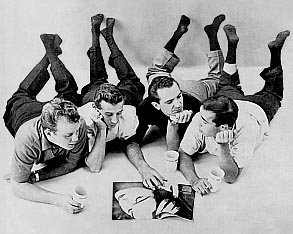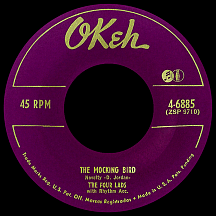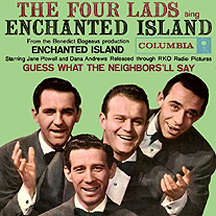THE FOUR LADS
St. Michael's Choir School in Toronto, Ontario has traditionally limited the number of enrollees it admits each year to a few dozen. Auditions are held and for each boy accepted the training is rigorous; performing as part of the boys' choir at St. Michael's Cathedral is the honor every student strives for. Several Toronto-born teenagers had gone through this process and been accepted to the school in 1947 and '48; they eventually became members of two of the most successful pop music vocal groups of the 1950s. After graduating from St. Michael's, Corrado "Connie" Codarini and Bernie Toorish started a quartet with schoolmates Rudi Maugeri and John Perkins. At some point, Rudi and John left and formed The Crew-Cuts with Pat Barrett and John's brother, Ray Perkins, going on to enjoy several mid-'50s hits including the chart-topping "Sh-Boom." By that time the other two had found replacements and begun their own successful series of hit records as The Four Lads.
Codarini and Toorish, along with Frank Busseri and Jimmy Arnold, all of them close in age and students at St. Michael's during the same years, first called themselves The Jordanaires and performed spiritual music in the Toronto area; the existence of a Jordanaires group in Missouri (who later backed Elvis Presley on a majority of his recordings) necessitated a change. For a short time they were The Otnorots (Toronto backwards, sort of) and then The Four Dukes. They met The Golden Gate Quartet backstage following an appearance in Toronto (founded in 1934, the black, Virginia-based gospel group had sold millions of records, appeared in major motion pictures and performed at the White House). An impromptu audition raised the interest of Golden Gate bass singer Orlandus Wilson, who recommended them to his group's manager, Michael Stewart, headquartered in New York City.
In the spring of 1950 they began performing popular standards and spiritual tunes at Le Ruban Bleu, a New York nightclub run by musician and showbiz personality Julius Monk. With a Four Dukes outfit already making the rounds, Monk suggested the still-teenaged Canadian singers adopt yet another new name, The Four Lads; Stewart, meanwhile, recommended them to Columbia Records (the Golden Gate Quartet had recorded for both the parent label and its subsidiary, Okeh, for many years), but after seeing them perform at Ruban Bleu, recently-hired head of A&R Mitch Miller wasn't as enthusiastic as anticipated.
At Stewart's request, the Four Lads stopped doing gospel songs and focused on sharpening their vocal harmonies, adding a mildly humorous component and relaxing their onstage presentation. Over a year passed before Stewart finally got them an assignment at Columbia backing Johnnie Ray on his second release for the Okeh label. It was a case of two rookie recording artists suspicious of the other's abilities, the Lads being less taken with Ray's expressively unusual vocal style than he was of their harmonic technique, but the end result was quite unlike anything that had come before. Ray's emotion-packed "Cry" (and its flip side, "The Little White Cloud That Cried") was issued in the fall of 1951 with label credit to Johnnie Ray and the Four Lads and had a long run at number one (the top seller of 1952) while the flip side separately hit number two. The Four Lads, it would seem, had made a splash, but Ray grabbed all the attention. When the quartet's Okeh single "Turn Back" failed, they were relegated to backing singer status for a time, doing duty with Doris Day ("The Second Star From the Right" from the Disney film Peter Pan) and backing Ray on another two-sided hit, "Please, Mr. Sun" and "Here Am I - Broken Hearted."
Dazz Jordan's gospel tune "The Mocking Bird" ('...the Lord looked down and he blessed the bird...he gave it the power to sing his word...'), was selected for their second Okeh single, returning them to their spiritual roots and taking a risk in the process; to the delight of the group and the record company, it was a top 30 hit in the summer of 1952. Without a strong follow-up, though, they continued their session work, backing Columbia artists Toni Arden, Jill Corey and Broc Peters (on his debut disc, "I Love You," a welcome introduction to the fascinating career of the singer and To Kill a Mockingbird actor who would soon change the spelling of his first name to "Brock").
Moving to the Columbia label, the group broke into the top ten in the fall of '53 with "Istanbul (Not Constantinople)" featuring Norman Leyden's orchestra, written by Jimmy Kennedy and Nat Simon as a takeoff of sorts on Paul Whiteman's 1928 novelty hit "C-O-N-S-T-A-N-T-I-N-O-P-L-E" (made before the Turkish city's name had changed). The "snake charmer" melody of "Istanbul" contained lyrics addressing our own country's penchant for change ('Even old New York was once New Amsterdam...why they changed it I can't say...people just liked it better that way!'). This lightly humorous approach was explored further; a year later they had an even bigger hit with "Skokiaan," a song by Rhodesian composer August Msarurgwa (the title referring to a drink popular with South African Zulu tribes). Rhodesia's Bulawayo Sweet Rhythms Band had started breaking in the U.S. with their instrumental version. The Lads got into the studio with bandleader Neal Hefti and rushed out a vocal rendition (the lyrics supplied by folk songwriter Tom Glazer). The Bulawayo record reached the top 20, the Four Lads went top ten and a big band version by Ralph Marterie topped them both; a prosperous time for everyone involved!

It was hit or miss, though; the next three singles didn't fare well and the Four Lads were handed more backing assignments. They joined Frankie Laine and The Buddy Cole Quartet for "Rain, Rain, Rain," which made the top 30. A single with pixie-haired Cathy Johnson dropped out of sight and her career disappeared in short order. The next few Four Lads discs didn't generate much interest and the future began looking bleak for the boys as well. They could have made attempts at covering rhythm and blues hits for the pop market (their pals the Crew-Cuts had been successful doing so) but resisted, preferring to stick with material they could call their own. Miller decided the exotic novelty songs had run their course; what happened next signaled an about-turn in the group's flagging career.
"Moments to Remember," as sentimental a song as anything ever written, had a six month chart run starting in August 1955 and became a million seller. Penned by Robert Allen and Al Stillman (who supplied hits for a number of artists including Perry Como and Johnny Mathis), the recording featured opening vocals by Lois Winter of The Ray Charles Singers and a spoken passage by Pat Kirby, a Decca Records songstress who'd gained notice on The Tonight Show Starring Steve Allen. Its success begat more of the same: "No, Not Much," another romantic million-selling Allen-Stillman song, spent the first half of 1956 on the charts. "Standing on the Corner" ('...watching all the girls go by!'), a Frank Loesser tune from the Broadway musical The Most Happy Fella, completed a triumphant trilogy when it became a major hit that summer. All three were arranged and conducted by Ray Ellis, who worked exclusively with the quartet for the next couple of years.
The year wrapped up with two more hits, Ken Darby's "The Bus Stop Song (A Paper of Pins)," from the hit movie Bus Stop starring Marilyn Monroe and Don Murray, and its flip side, Sylvia Dee and Sidney Lippman's "A House With Love in It." The Lads developed a variety of onstage routines sometimes involving band members, other artists on the bill and even audience members, giving them a "prankster" reputation that contrasted their sound on vinyl. Allen and Stillman stepped up again with "Who Needs You," a strong seller in 1957. The hits kept coming nonstop, though they weren't as spectacular as the one-two-three punch of the previous year. "I Just Don't Know" (penned by Allen and Joe Stone), "Put a Light in the Window" (a Rhoda Roberts-Kenny Jacobson song) and the 1958 Allen-Stillman hits "There's Only One of You" and the theme from the film "Enchanted Island" kept the streak going.
"The Mocking Bird," the group's 1952 hit on Okeh, had hit the charts briefly in 1956 on Epic, a curious label detour. In 1958, the guys made a new stereo version and it was finally released on the Columbia label, reaching the top 40 in November of that year; a single act hitting the charts three times on as many different labels stands as a rare feat in the latter half of the 20th century. There were a few more mid-chart hits in 1959, Paul Francis Webster and Jerry Livingston's "The Fountain of Youth" sandwiched between Allen-Stillman songs "The Girl on Page 44" and "Happy Anniversary." The Four Lads left Columbia at the end of their contract in 1960 and signed with Kapp Records but had no luck with anything they put out through mid-1961. Then, four singles on the Dot label dotted the record stores (and the bargain bins shortly thereafter).
Connie Codarini left around that time (later becoming a successful restaurant owner in Ohio). Bernie Toorish, Jimmy Arnold and Frank Busseri were joined by New Yorker Johnny D'Arc, the first U.S.-born member of the previously all-Canadian foursome. Signing with United Artists in 1963, there were sporadic record releases for several years. Initially they seemed to prefer movie music like the title themes from multi-star comedy It's a Mad, Mad, Mad, Mad World and Oscar-winning 1963 films Tom Jones (Best Picture) and Lilies of the Field (Best Actor Sidney Poitier), but were soon reduced to remaking their famous hits (a back-to-back rehash of "No, Not Much" and "Standing on the Corner" came out on UA in '66). Later, they appeared on Billboard's Easy Listening charts, with "A Woman" in '68 and a remake of the Gary Lewis and the Playboys hit "My Heart's Symphony" in '69.
Toorish left in 1970 and was replaced by Sid Edwards, another singer from the U.S.; Arnold departed several years later. The act endured for many years with a new lineup, Busseri the only remaining member, though he stopped singing at some point while continuing to manage the group. At one point in the 1980s they added a female vocalist, Busseri's girlfriend Lynn Roberts, and billed the act as Four Lads and a Lass.
NOTABLE SINGLES:
- Cry - 1952
by Johnnie Ray and the Four Lads / - The Little White Cloud That Cried - 1952
by Johnnie Ray and the Four Lads - Please, Mr. Sun - 1952
by Johnnie Ray with the Four Lads / - Here Am I - Broken Hearted - 1952
by Johnnie Ray with the Four Lads - What's the Use? - 1952
by Johnnie Ray with the Four Lads - Turn Back - 1952
- The Mocking Bird - 1952
- Somebody Loves Me - 1952
- I Love You - 1953
by Broc Peters and the Four Lads - Istanbul (Not Constantinople) - 1953
- Skokiaan (South African Song) - 1954
- Rain, Rain, Rain - 1954
by Frankie Laine and the Four Lads - Moments to Remember - 1955
- No, Not Much! /
I'll Never Know - 1956 - Standing on the Corner /
My Little Angel - 1956 - The Bus Stop Song (A Paper of Pins) /
A House With Love in It - 1956 - Who Needs You - 1957
- I Just Don't Know - 1957
- Put a Light in the Window - 1957
- There's Only One of You - 1958
- Enchanted Island - 1958
- The Mocking Bird - 1958
- The Girl on Page 44 - 1959
- The Fountain of Youth - 1959
- Happy Anniversary - 1959
- A Woman - 1968
- My Heart's Symphony - 1969



